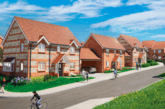 With a record 1.2million households currently on waiting lists for social housing, David Cracklen (left), director of Dorset-based AJC Group fears Michael Gove’s planning changes will starve rural communities of much-needed affordable homes.
With a record 1.2million households currently on waiting lists for social housing, David Cracklen (left), director of Dorset-based AJC Group fears Michael Gove’s planning changes will starve rural communities of much-needed affordable homes.
The latest available industry reports state that fewer than 4,500 social homes were built in 2019-20, but there were over 250,000 people on a housing waiting list in rural areas by 2020. Across the entire UK, only 157,000 of the Government’s own target of 180,000 affordable homes were built during 2021. Homes England only distributed grants for 6,250 rural homes – half the number required under the policy.
With Michael Gove’s recent amendment to the Levelling Up and Regeneration Bill scrapping mandatory housing targets, a huge population of people in rural areas will be forced to relocate away from their home town or village. Local authorities and communities will now be able to determine how many homes might be built in their area, but the voices and needs of those on housing waiting lists are unlikely to be considered.
Even when there were mandatory housing targets, a high proportion of planning applications for new homes went to appeal, even for designated and allocated sites. The costly appeal process typically delays a development start by at least 12 months. However, planning barristers’ success rates have been relatively high because housing targets were in place and a non-NIMBY approach to determining planning applications could be applied. Without clear housing targets, I fear rural development will become scarcer than we’ve ever known in our lifetimes.
The company is currently concluding the construction programme at a development of 21 houses in the rural Dorset village of Hazelbury Bryan. Located off Pidney Green, the nearest small town of Sturminster Newton is nearly five miles away. The terms of the S.106 for our permission required a 40% affordable housing allocation. However in line with the company’s social and corporate strategy, the site has been delivered in partnership with an HA as a 100% affordable scheme.
We have applied the same scenario to its development of 27 homes in Okeford Fitzpaine, which is another rural village in Dorset. The company is delivering the 100% affordable scheme, despite the planning conditions stipulating a requirement for only 11 affordable dwellings.
Jeremy Hunt’s announcement of a below inflation 7% rent cap for the social rent sector will hopefully not stifle growth at a critical point for this sector, but the disastrous planning policy change will. The UK’s broken planning system – and the prolonged debacle to determine phosphates, nitrates, and nutrient neutrality – means green lights for new development has already been few and far between for some time.
For developers such as us who do have live sites, the cost of delivering much-needed EPC-A and B rated homes has sky-rocketed. We are currently delivering a total of 230 homes at seven sites across the Wessex region. The cost of labour, materials, plant, and machinery is incomparable to the original budget forecasts. With the planning system in crisis, and affordable homes completions already falling far short of demand, how can the industry strive towards delivering the new homes the UK desperately needs?









